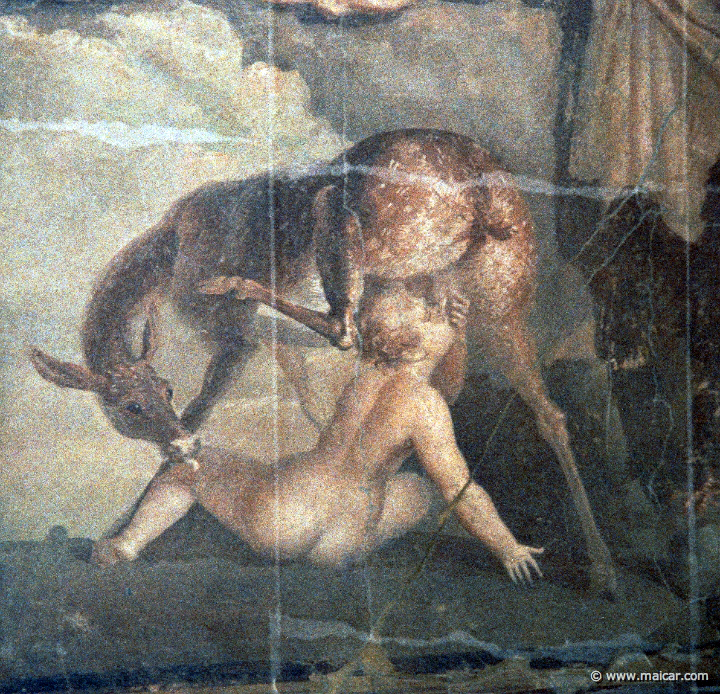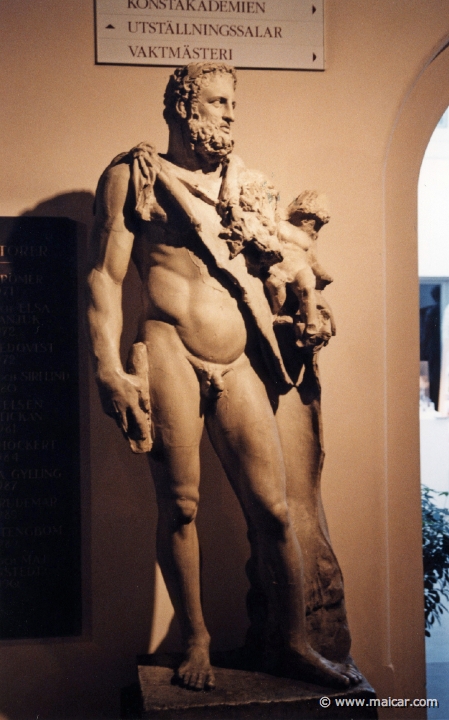|

|
Survival of the child Telephus. 7114: Hercules finds his son Telephus in Arcadia (detail). Ercolano, Basilica. National Archaeological Museum, Naples.
|
|
After an uncertain birth in Arcadia, Telephus is thought to have come to Teuthrania, the country in Asia Minor near the river Caicus and the city of Pergamum, north of Mount Sipylus. Here he became, through his mother, related to King Teuthras 1, who adopted him as his son and heir. Having become king in this part of Mysia, Telephus repelled the ACHAEANS when they
invaded the country, and was healed, by unusual
means, of a wound received in battle.
Telephus exposed
When Heracles 1 came to Tegea in Arcadia he made love to Auge 2, not knowing that she was King Aleus' daughter. Of this union, a boy was born that was secretly hidden by Auge 2 in the precinct of Athena. But Aleus,
some say, discovered her daughter's motherhood when
he, on account of a pestilence that was ravaging
the country, visited the temple of Athena. He then took the
babe and exposed it in Mount Parthenius; and if the
child had died, probably nothing would be known
about him. But since Providence or the gods took
care of him, he survived, being nourished by a doe
that had just cast her fawn. Soon shepherds
appeared who took up the babe and called him
Telephus.
Children abandoned
Now, some might be tempted to think that exposed
babies are often saved by someone. For Minos 2's grandson
Miletus was exposed and survived; and so did
Aechmagoras whom Heracles 1 rescued; and Aegisthus was suckled by a goat and lived; and Hippothous 2, son of Poseidon and Alope, was
suckled by a mare and survived; and also Amphion 1 and his
brother Zethus were exposed as infants, but a
herdsman found and reared them; and Asclepius was saved by
a shepherd; and Atalanta was exposed by
his father, but a bear came and gave her suck until
hunters found her; and Atalanta herself
exposed her son Parthenopaeus, pretending to be
still a virgin, but he grew up and became one of
the SEVEN AGAINST
THEBES; and the twins Lycastus 3 and Parrhasius, sons of Ares and Phylonome, were suckled by a wolf and later
saved by a shepherd; and Meliteus, son of Zeus and Othreis, was also
exposed and saved by bees which fed him; and Neleus was exposed; and Oedipus; and the twins Romulus and Remus 1; and Paris. These are known, however, not so much for having
been exposed, but for having survived; and it is
their survival that made their exposure known. But
there cannot be any record about those who do not
survive, since they leave this world without a name
and as soon as they arrive. And since to be saved
is naturally regarded as an exceptional and lucky
circumstance, the number of those who perish for
being abandoned, although unknown, might be
reasonably assumed to be larger than the number of
those who survive.
Severe father condemns his daughter
After Telephus had been exposed then, Aleus,
being everything but proud of his, as he saw her,
debauched daughter, gave her to Palamedes' father Nauplius 1, who was an excellent sailor and a genius in other respects too, with instructions to sell her far away. And Nauplius 1, who easily navigated most parts of the known world, brought her to Teuthrania in Mysia (near Pergamum in Asia Minor), where she was married to Teuthras 1, the ruler of that land, who had by her a daughter Argiope 4. But others have said that Heracles 1 could not ignore what he was doing when he made love to Auge 2, since he was a guest in Aleus' home, where he had come after the campaign that resulted in the restoration of Tyndareus as king of Sparta. They also say
that Aleus discovered the motherhood of his
daughter, not by finding a child in the shrine of Athena, but by noticing
that she was pregnant. For some reason or another,
Aleus did not believe his daughter when she
disclosed that Heracles 1 had been her lover. And so he gave her to Nauplius 1, ordering him to drown her in the sea.
What Nauplius 1 did not do
Nauplius 1 took the girl with him; but as they, in their way to his harbor in Argolis, came near Mount Parthenius, she withdrew into a thicket as if to perform some natural necessity. It was then, they say, that Auge 2 gave birth in a place where a temple to Ilithyia was later built to the male child, which she left hidden in the bushes. When she returned, Nauplius 1, ignoring what had happened, took her to the harbor; but instead of drowning her, as he had been instructed to do, he made a gift of her to some Carians who were about to sail to Asia. This is how Auge 2 was brought to Teuthras 1, king of Mysia, although others simply say that she fled to that country.
How Telephus was saved
Telephus himself was found by herdsmen belonging to King Corythus 3, when he was being fed from the teat of a hind. These men, they say, brought the child to the king, who raised him as his own son and called him Telephus. Years later Telephus, desiring to learn about his mother, went to Delphi where the oracle instructed him to sail to the court of Teuthras 1 in Mysia. Here Telephus reunited with his mother, and having married Teuthras 1's daughter Argiope 4, inherited the throne at the king's death. Still others have said that Telephus and Atalanta's son Parthenopaeus were exposed at the same time at Mount Parthenius, and that shepherds found them both and reared them, while Auge 2, fearing her father, fled to Mysia, where King Teuthras 1 adopted her as his own daughter.
Telephus defeats Idas 2 ...
|

|
6928: Heracles and the child Telephus. Moulded in Paris. In Stockholm since 1698. Konstakademin, Stockholm.
|
|
Telephus, they add, came to Mysia in the company of Parthenopaeus, looking for his mother in accordance with an oracle. At the time, Idas 2 (the man who killed Castor 1, one of the DIOSCURI) threatened the country. So Teuthras 1 promised both kingdom and his adoptive daughter Auge 2 to Telephus in exchange for protection against his enemy. Telephus, they say, accepted the proposal, and along with his friend Parthenopaeus, defeated Idas 2. Fulfilling his promise, Teuthras 1 gave Auge 2 as wife to Telephus, but she, being faithful to Heracles 1, did not wish anybody to touch her body. That is why Auge 2 drew a sword to slay Telephus as they entered the wedding chamber. However, a big serpent glided between them, as they say by the will of the gods, making her drop the sword; and when Telephus was about to kill her, she called for help on Heracles 1, being then
recognized by Telephus as his mother.
Aleus submerges daughter in the sea
Yet others affirm that Auge 2 and her child Telephus were submerged in the sea by Aleus, but that through Athena's providence they navigated the sea in the chest, being cast ashore in Teuthrania, where King Teuthras 1 received them, marrying Auge 2 and raising Telephus as his own son. In any case, Telephus ruled in Mysia when the
country was invaded by the ACHAEANS, who intending
to punish Troy on account
of the abduction of Helen two years before, came by mistake to Mysia,
thinking it Trojan territory, and pillaged it. Now
Telephus' forces reacted energetically, and
repelled the invaders, killing, among others, Oedipus' grandson Thersander 1. This defeat by the banks of the river Caicus
forced the ACHAEANS to return to Hellas, and made a second gathering several years later at Aulis, the Boeotian harbor; but Telephus himself, having been pursued during the battle, was entangled in a vine-branch and wounded by Achilles's
spear in the thigh.
Telephus in Aulis
Some believe that the ACHAEANS did not know
how to reach Troy, being
that the reason why they landed in Mysia. It is
then said that when eight years later the ACHAEANS gathered once more their forces in Aulis, they were perplex about the voyage because no one could show them the way. In the meantime, Telephus' wound was unhealed; and having consulted the oracles he learned that the one who had wounded him was the same who would cure him. That is why Telephus, clad in rags but
apparently knowing the sea better than the ACHAEANS, appeared in Argos to beg Achilles to help his
wound. And in exchange, he said, he would show the
way to Troy. Having reached
this agreement, Achilles healed him by
scraping off the rust of his spear, and Telephus
showed the course, the accuracy of which was
confirmed by the seer Calchas. Others said that when Telephus arrived to
receive medical attention, he, following Clytaemnestra's
advice snatched little Orestes 2, threatening
to kill him if he was not healed. It is said that
the ACHAEANS accepted
this blackmail because an oracle had said that Troy could not be taken
without the aid of Telephus. But as Achilles replied that
he ignored the art of healing, Odysseus said:
"Apollo does not mean you, but calls the
spear the inflictor of the wound." (Odysseus to Achilles. Hyginus, Fabulae 101).
So they scraped the spear on the wound, and
Telephus was healed by the same ashen spear that Peleus had received from Chiron when he married
Thetis. Achilles, who
received it from his father, took to the war at Troy this heavy and huge
spear, which, as they say, no one among the ACHAEANS was able to wield. The ACHAEANS then
invited him to join the expedition, but Telephus,
being (as some say) the son-in-law of Priam 1, refused. He
nevertheless led them to Troy before returning to
Mysia.
Achilles' son kills
Telephus' son
Telephus did not fight in the Trojan War, but his son Eurypylus 6 came to the war with a force of Mysians, and was killed by Neoptolemus. |